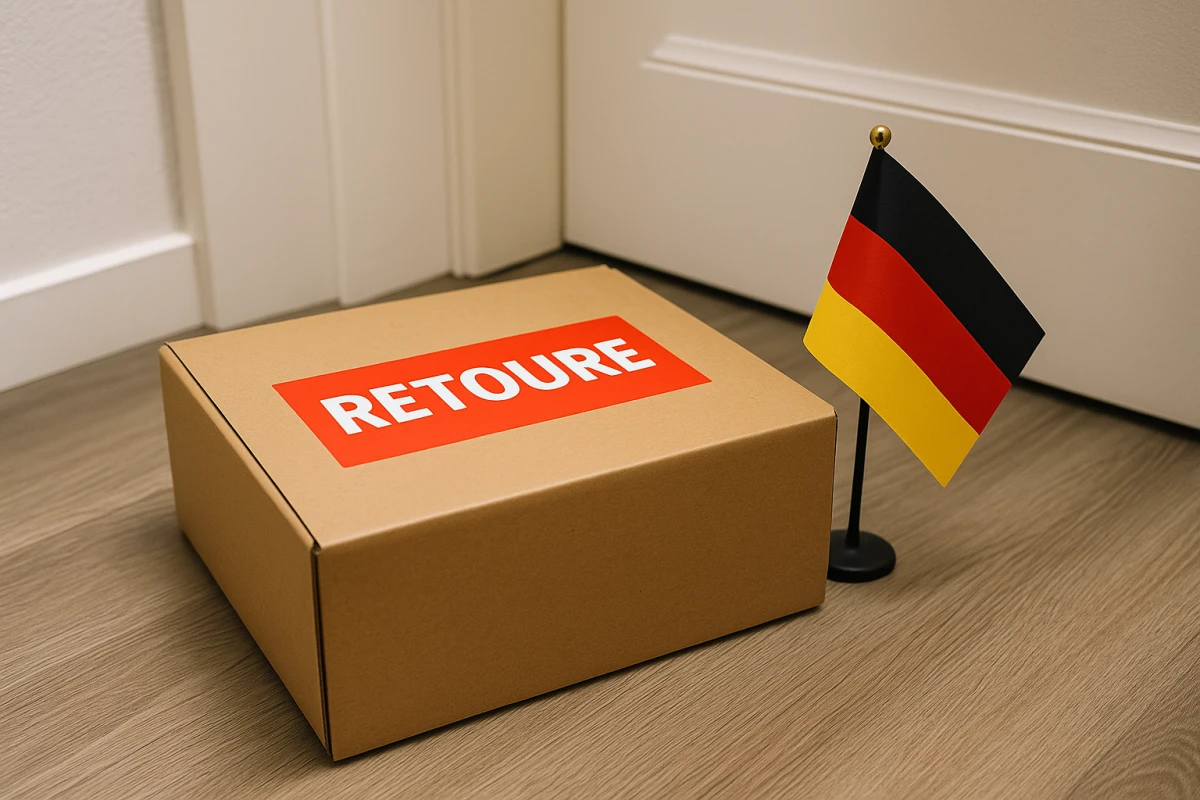


Free Returns: What Germany’s Top 100 Online Shops Reveal About Customer Expectations
What return policies do Germany’s Top 100 online shops offer? 🇩🇪
Germany is one of Europe’s largest e-commerce markets, where customers expect returns to be simple and fair. Our analysis reveals how long the biggest players allow for returns, when free returns apply, and which brands go the extra mile with exceptionally generous policies.
What return policies do Germany’s Top 100 online shops offer? 🇩🇪
Germany is one of Europe’s largest e-commerce markets, where customers expect returns to be simple and fair. Our analysis reveals how long the biggest players allow for returns, when free returns apply, and which brands go the extra mile with exceptionally generous policies.
What Our Analysis of Germany’s Top 100 Online Shops Revealed
To understand what German customers really expect, we examined the Top 100 e-commerce players in Germany. The results are clear: free and hassle-free returns have become the market standard.
84% of shops offer free returns.
12% don’t allow returns at all – usually food, medicine, or investment products excluded by law.
4% apply conditions – for example, ASOS and Shein: the first return is free, every additional one comes with a small fee.
When it comes to return windows:
30 days is the most common option, offered by half of all shops.
14 days still hold in about a third of shops, especially in electronics.
Longer windows are rare: Teufel give 60s days, Bett1.de and Eis.de go up to 100 days, and Decathlon tops the list with 365 days for loyalty members.
👉 On average, German customers can expect around 29 days to decide, with a median of 30 days. In other words: about a month to try, test, and send products back.

How Return Policies Differ Across E-Commerce Segments
🧥 Fashion & Footwear
Here, free returns are practically the rule. Most major fashion retailers (Zalando, Bonprix, H&M, About You, Breuninger) offer 30 days of free returns. Some go even further – Adidas, for example, allows 60 days, and up to 90 days for adiClub members.
The exceptions lie in the fine print: ASOS and Shein cover only the first return from an order for free; each additional one costs around €3.95–4.50. Zara, meanwhile, charges €2.95 for postal returns, offering free returns only in-store.
📱 Electronics
Electronics retailers tend to be more conservative. Most (MediaMarkt, Saturn, Notebooksbilliger, Cyberport) stick to the legal 14-day return period, albeit with free return labels. A few sweeten the deal – Cyberport, for instance, voluntarily extends the window to 30 days at no extra cost.
🛋 Furniture & Home Goods
This is where things get tricky. Home24, Westwing, and XXXLutz attract buyers with 30-day free returns, including free pickup of bulky items. But exceptions apply: custom-made products (say, a fitted kitchen) are excluded.
🍎 Groceries & Pharmaceuticals
In this category, free returns are virtually nonexistent.
Groceries and frozen goods (Bofrost, Flaschenpost, REWE) are legally excluded from the right of withdrawal. Returns are possible only in cases of defects.
Medicines and para-pharmaceuticals (DocMorris, Shop-Apotheke, Medpex) can be returned only if the packaging is unopened; hygiene rules exclude anything else.
💍 Jewelry & Specialty Items
For jewelry and watches (Christ, Pandora), returns are generally free within 30 days, but only if unworn. In contrast, investment metals (Degussa, Auragentum, GoldSilberShop) are completely excluded from returns under German law.

Why Return Policies Matter So Much in Germany
In Germany, returns aren’t just a logistical detail – they’re a key factor of trust that directly influences buying decisions. On average, German online shoppers return 11% of their purchases, and only a quarter of customers say they’ve never sent anything back. In other words, returns are part of everyday e-commerce life.
From the customer’s perspective
German shoppers value legal certainty and low risk. Free returns give them the confidence to try products without fear of being stuck with the wrong choice. This is especially critical in categories with high return rates, like fashion and footwear.
Convenience also matters. Shops that provide a prepaid return label – or even doorstep pickup – are seen as professional and trustworthy. Research shows that free returns significantly reduce the perceived risk of buying online and boost conversion rates.
From the retailer’s perspective
For online shops, returns are a double-edged sword. On one hand, a fair returns policy increases conversion and helps build long-term loyalty. In fact, 54% of German customers say free returns are the second most important factor when deciding where to shop.
On the other hand, free returns drive up logistics and processing costs. That’s why some brands are experimenting with compromises: Zara now charges a small fee for postal returns, while ASOS and Shein make only the first return free per order.
Balancing Comfort and Sustainability
Free returns boost customer comfort – but they also create an environmental challenge. Every parcel sent back adds to the carbon footprint.
Some retailers are beginning to address this openly. Approaches range from charging small fees for excessive returns to investing in smarter tools that help customers pick the right product the first time. Examples include detailed sizing guides, better product descriptions, and even virtual try-ons.
By highlighting sustainability, brands not only cut costs but also resonate with German consumers, who are highly sensitive to ecological issues. In many cases, showing that you care about reducing unnecessary returns can strengthen trust just as much as offering free returns.

What This Means for Online Shops Looking to Succeed in Germany
Free returns are (almost) a must. Asking customers to pay for postage themselves is seen as an anomaly in the German market.
30 days as the minimum. Offering only the legal 14 days is perceived as stingy in Germany. A longer return window builds trust and boosts conversions.
Communicate transparently. Customers want to know exactly what applies – especially exceptions (hygiene products, custom-made items, groceries).
Offer multiple options. A mix of online return labels, drop-off points (PaketShops), and in-store returns is highly appreciated in Germany.
Consider sustainability. German customers are sensitive to ecological issues. Shops can reduce return rates with more detailed product descriptions, virtual try-ons, or small fees for repeated returns.
Summary: Free Returns Are the Standard in Germany
Our analysis of the Top 100 German online shops shows a clear trend: German customers see free and hassle-free returns as a given.
84% of shops offer free returns.
The most common return window is 30 days.
Only a handful of retailers charge fees or exclude returns altogether.
At the same time, new trends are emerging: some players are testing small fees for postal returns, others stand out with exceptionally long return windows. And sustainability is playing a growing role – from reducing unnecessary returns to minimizing their environmental footprint.
What This Means for Companies Planning to Expand
If you plan to enter the German market, you should:
treat free returns as a must-have,
set a return window of at least 30 days,
communicate exceptions transparently,
and think about both sustainability and customer comfort.
✅ Free returns are no longer a competitive advantage – they’re the market standard. The real differentiator is how well you design the process, how clearly you communicate it, and how seamlessly you align it with sustainable e-commerce practices.
Table of contents
- What Our Analysis of Germany’s Top 100 Online Shops Revealed
- How Return Policies Differ Across E-Commerce Segments
- Why Return Policies Matter So Much in Germany
- What This Means for Online Shops Looking to Succeed in Germany
- Summary: Free Returns Are the Standard in Germany
- What This Means for Companies Planning to Expand

How we can help you
Our team will help you with the first steps of your expansion as well as long-term marketing strategies.
